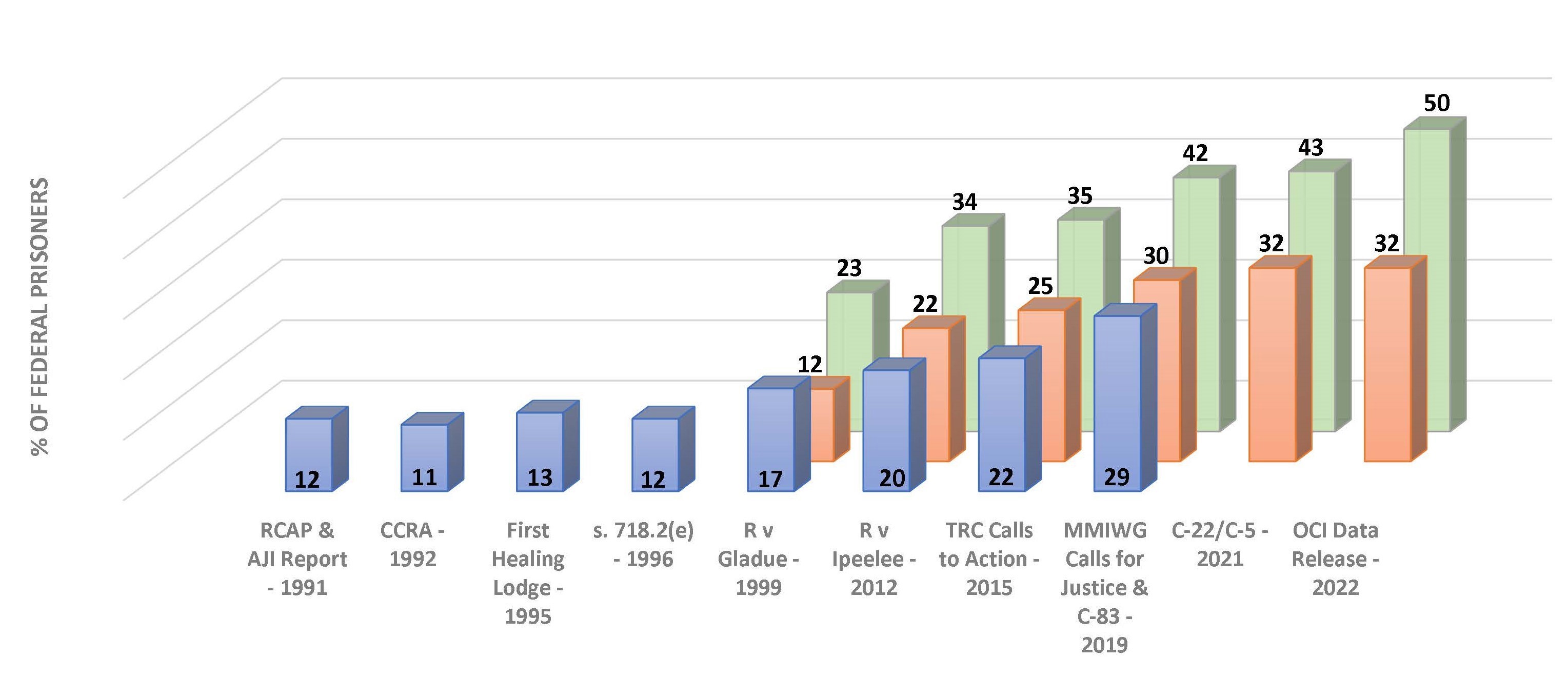
Decarceration
Despite Canada aspirations to be a leader internationally with respect to human rights, those most marginalized in Canada, especially as a result of gender, race, class, and ability, are not afforded the rights and supports that others take for granted. By failing to redress inequality, current government support programs too often entrench instead of eliminate poverty, unequal opportunities, systemic racism and exclusionary barriers.
This failure of every other system to address underlying social, health and financial needs leads to mass criminalization and incarceration, particularly among racialized and disadvantaged communities.
Over twenty years ago, when Indigenous Peoples were 12% of those in federal prisons, the Supreme Court declared this reality a crisis. Over the past two decades, despite attempts to address increasing reliance on prisons, the crisis has increased exponentially and the situation is dire.
Currently, Black Canadians comprise of 3.5% of Canada’s population, and yet represent 9.2% of those in federal prisons. Indigenous Peoples represent 5% of those in Canada and 32% of the federal prison population. Half of women in federal prisons are Indigenous.
If mass incarceration was a crisis in the 1999, then the current state is nothing short of an epidemic. It is time to address the underlying inequalities that have resulted in mass incarceration, beginning with decarceration strategies focused on the social determinants of health, implementing a guaranteed livable basic income, removing barriers to community integration, and putting resources in communities and not the carceral system.

Resources for Prisoners and Families
News Releases
2025
- Canada Must Invest in Indigenous Peoples, Not Prisons, September 29, 2025
- 50th Anniversary of Prisoners' Justice Day Observed, August 10, 2025
- Courts Are Revealing Systemic Abuse of Prisoners’ Human Rights. Tona’s Law Will Give
Them the Tools to Respond., June 3, 2025
2023
- All Too Familiar: The Urgent Need for Mental Health Interventions NOT Jail to Prevent Homicides, December 14, 2023
- Prisoner Justice Day Observed, August 10, 2023
2022
- Statement on the 15th Anniversary of the Death of Ashley Smith, October 19, 2022
- Correctional Investigator Sounds Urgent Alarm: It’s Well Past Time to Correct Corrections, February 10, 2022
2021
- Indigenous Women Make Up 50% of Women in Prison; Bill C-5 & Canada’s Mandatory Minimum Penalty Mess Will Make Matters Worse, December 17, 2021
- Exorbitant Costs of Segregating Prisoners Signals Dire Need to Correct Corrections, November 24, 2021
- Prisoners’ Justice Day Observed, August 21, 2021
- On the 25th Anniversary of the Arbour Report, Torture of Prisoners Persists in Canadian Prisons, April 1, 2021
2020
- Reports of Human Rights Violations and Systemic Racism in Prisons Require Urgent Action, October 27, 2020
- Senator Pate Observes Prisoners’ Justice Day, August 10, 2020
- Statement from Senator Kim Pate on COVID-19 Measures in Federal Prisons, March 13, 2020
- The Correctional Investigator Underscores the National Travesty of Increasing Over-representation of Indigenous Peoples in Canadian Prisons, January 22, 2020
2019
- 12 Years and Counting Since Ashley Smith Death by Homicide, October 18, 2019
- Senator Wanda Thomas Bernard and Senator Kim Pate Observe Prisoners’ Justice Day, August 10, 2019
- Can Canada Correct Corrections?, March 27, 2019
2018
- Implications of the Auditor General’s Report on the Cost of CSC’s Failure to Integrate of Prisoners into the Community, November 21, 2018
- We Must Do Better: Senators Comment on the Office of the Correctional Investigator’s Annual Report, November 1, 2018
- Senator Kim Pate Observes Prisoners’ Justice Day, August 10, 2018
- Statistics Canada Numbers Necessitate Immediate Action to Decarcerate Indigenous Peoples, June 26, 2018
- Corrections Continues to Use Discriminatory Classification Tools, June 13, 2018
- Corrections Cover Up: Why Won’t They Show Us the Money?, March 22, 2018
2017
- Statement on the Report 5 of the Auditor General of Canada on Correctional Service Canada’s Preparation of Women Prisoners for Release, November 21, 2017
- Statement on the Office of the Correctional Investigator’s Annual Report, October 31, 2017
- Statement on the 10th Anniversary of the Death of Ashley Smith, October 19, 2017
- Open Letter by Senator Murray Sinclair and Senator Kim Pate to Premier Ball on the Unjust Incarceration of Beatrice Hunter, June 12, 2017








